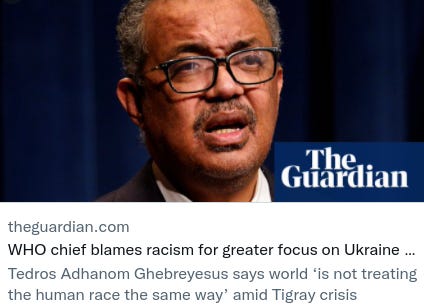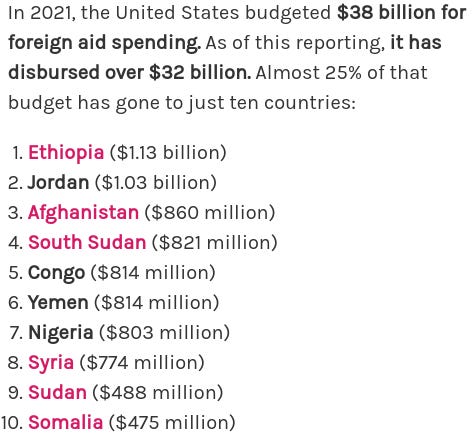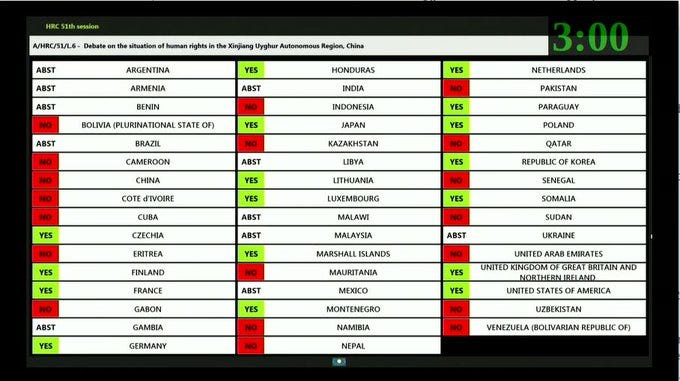Africa and the lie of neutrality
The UN votes on Tigray, Xinjiang, Ukraine and the failure of the Global South
The UN voted on Friday to extend a monitoring mission for the war in Ethiopia, where the federal government under Prime Minister Abiy Ahmed has cut off the northern Tigray region of 7 million people and waged a siege against it with the help of Eritrea for over two years now.
UN investigators believe war crimes and crimes against humanity may have already taken place during that time. I have interviewed Tigrayan survivors and heard many testimonies of genocidal conflict, weaponized starvation and genocidal rape. The UN vote to look deeper is good news, but it also reveals something disturbing.
In April, World Health Organization director-general Tedros Adhanom Ghebreyesus, an ethnic Tigrayan himself who has called the conflict “the worst disaster on Earth,” said the reason the conflict in Tigray is not getting the attention it deserves, compared to other conflicts such as the war in Ukraine, is due to racism. I disagreed.
There are a lot of very good reasons to care more about the war in Ukraine. In fact, even if you only care about Ethiopian lives, you still might care more about the war in Ukraine since the nuclear threat or subsequent grain and fertilizer shortages may end up taking more Ethiopian lives than the conflict in Tigray itself.
But I ended up speaking to Tedros, and he convinced me that racism is indeed a factor, which I duly noted when writing about the issue later.
But racism only tells part of the story, because consider the fact that in the recent UN vote to investigate possible war crimes in Tigray, over 70% of the countries that voted in favor are majority-white nations while 100% of those that voted against are non-white. This seems to run counter to the narrative that it’s the Global North that doesn’t care and the Global South that stands up for the marginalized, opposing things like racism or genocide. For instance, look at the recent UN vote on racism.
But if we take a closer look, we find that these nations opposed the resolution not because they are pro-racism (the US is consistently ranked, it may surprise you to learn, as among the least racist nations in the world) but because, as the UK government later explained in a press release, they oppose the Durban Conference, which equates Zionism with racism, and they oppose requiring states to make reparations for the slave trade and colonialism.
As for the idea that the Global South supposedly cares more about the oppressed, bear in mind that the Tigray resolution was rejected by every single African member of the Human Rights Council.
Not to mention, most of the votes in favor come from right-wing governments whereas leftist one, which we're often told represent the rights of the people, voted against, including China, Venezuela, Bolivia and Cuba. And we saw the same pattern in the recent UN vote on whether to debate the situation in Xinjiang.
And you may have seen the infographic below showing the variety of views African nations have about the "Aggression against Ukraine” resolution.
That’s three situations where genocide is arguably taking place. Part of the problem is, these nations are allied with Russia, China or both and are often simply voting in ways so as not to upset their economic partners. But another important element here is the fact that every African nation except South Sudan and Western Sahara is a member of the Non-Aligned Movement (NAM), which advocates non-interference in the domestic affairs of other nations. This echoes China’s non-interventionist position (except when it comes to annexing Xinjiang, Hong Kong, Taiwan or whatever else it wants). But NAM is far broader than China and Africa.
This is a map of NAM’s 120 member states in dark blue and 20 observer states in light blue. If you haven’t heard of NAM before, you should have—it’s the largest grouping of states in the world after the UN. And while it’s non-interventionism did begin in good faith, emerging in the wake of the Korean War to help counter Cold War polarization, it has quickly become a way for authoritarian states to push back against the influence of political idealism and the democratic liberal order.
In other words, it’s a power bloc for socialist dictators who want to encourage everyone else to mind their own business. Most NAM chairmen have been socialists, including peacemakers such as Nelson Mandela of South Africa and Hosni Mubarak of Egypt, but also the military dictators like Fidel Castro (twice) of Cuba and Suharto of Indonesia, not to mention several psychopaths such as Robert Mugabe of Zimbabwe, Mahmoud Ahmadinejad of Iran, Nicolas Maduro of Venezuela and the current chair Ilham Aliyev of Azerbaijan.
It’s a bit of a dilemma, because we don’t want to fall back into Cold War thinking whereby those who are not with us are against us and must be squeezed by economic or even military means. But on the other hand, when neutrality is hijacked by bullies, it falls upon the strong to defend their victims because in that situation, neutrality becomes a lie. As Chrisopher Hitchens wrote in a 2011 article, “American Inaction Favors Qaddafi”:
Doing nothing is not the absence of a policy […] “Neutrality” favors the side with the biggest arsenal. “Nonintervention” is a form of interference.
Or consider philosopher Peter Singer’s famous allegory of the drowning child:
To challenge my students to think about the ethics of what we owe to people in need, I ask them to imagine that their route to the university takes them past a shallow pond. One morning, I say to them, you notice a child has fallen in and appears to be drowning. To wade in and pull the child out would be easy but it will mean that you get your clothes wet and muddy, and by the time you go home and change you will have missed your first class. I then ask the students: do you have any obligation to rescue the child?











